|
|
Reviewed by Glenn Erickson
In 2002 Todd Haynes directed Far from Heaven, a conscious attempt to re-visit Douglas Sirk's 1955 'women's weepie' potboiler All That Heaven Allows, right down to the oversaturated colors, bright fall foliage and lush vintage interiors. Although Haynes' film captures the right look, the original is so dependent on its '50s context that it can't be replicated now, at least not in the same way. Sirk's film illuminates a bygone 'consensus' America that won't tolerate even small deviations from accepted behavior. The frustrated wife in Far from Heaven not only discovers that her husband is gay, she seeks solace in an interracial relationship. Both of those issues of course existed in the 1950s, but polite society declined to acknowledge them. As taboo topics, they were banished from the media and mostly talked about in cautious whispers. Kept in a 'reality Kindergarten', readers and audiences of that decade were scandalized by the 'shocking' content of things like Peyton Place.
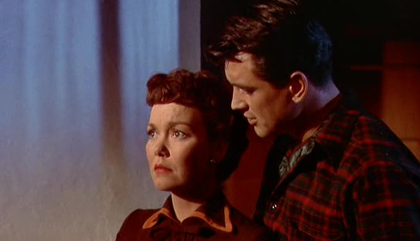
Douglas Sirk's 1950s melodramas were popular but disposable entertainments that came into their own only when American critics, influenced by their French colleagues, began discovering a new vitality in Hollywood product of the Cold War years. Embraced by critics looking for formal values and proto-feminist ideas, Sirk gained a new respectability, even if the consensus was that he was worthwhile because his work transcended an unworthy genre. Made for Universal-International producers Ross Hunter and Al Zugsmith, Sirk's glossy pictures are soap operas loaded with romance, color, and a kind of 'High Hollywood' style that never quite becomes high camp. Fake and honest at the same time, they are artificial constructions filled with powerful real emotions. Douglas Sirk is a genuine original. The contemporary director that has really carried on the 'Sirkian' tradition is Spain's insightful Pedro Almodóvar.
All That Heaven Allows was an instant follow-up to Magnificent Obesession, Douglas Sirk's breakout Universal soaper that made Rock Hudson a star. That picture's great achievement was to prevail over story elements so absurd as to be insulting. No matter how preposterous things become, the movie always makes emotional sense.
The setup in Heaven is much simpler. The good-looking widow Cary Scott (Jane Wyman) has plenty of money but finds herself in a socially awkward position. One older suitor offers her 'companionship' and a middle-aged lothario (Donald Curtis) tries to rush her into the sack, but Cary holds out for something better. She finds herself attracted to handsome, gracious Ron Kirby (Rock Hudson), her gardener. Cary is intrigued by Ron's simple approach to life and his disdain for her petty associates. Although the 'nature man' Ron is fifteen years her junior, she's captivated by the perfect home he makes for them in an abandoned mill. Cary can ignore the disapproval of her snooty friends, but is horrified when her own grown children throw tantrums at the thought of her marrying someone they assume is so obviously after her money. The thought of their mother having sex with a younger man is unthinkable. Cary impulsively calls off her engagement, a decision she soon regrets.
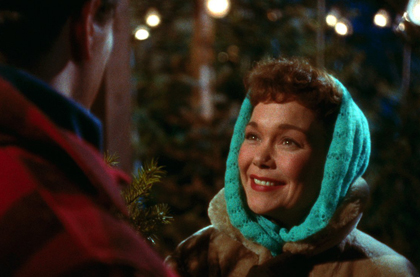
This insightful movie can be seen as an outgrowth of the glossy romance fiction found in '50s women's magazines, in which the mere suggestion of illicit sex or adultery was enough to arouse the presumably repressed target audience. Our Cary Scott is a bourgeois fantasy, an affluent woman untroubled by the basic problems of making a living. Cary has grace, good manners and keeps most of her inner doubts to herself. But when something perfect comes along that holds the promise of true happiness, social forces seem to militate against her. 1
Heaven is about the invisible chains of an informal, rigidly unforgiving social system. Local gossip Mona Plash (Jacqueline deWit) lurks like a viper, ready to slur Cary's reputation. Cary's best friend Sara (Agnes Moorehead) means well but is also intimidated by social pressure, and advises Cary to lay off the younger Ron. The real anguish comes via Cary's children. To our surprise, it is the conservative younger generation that harbors twisted notions of sex. Psychology-quoting Kay (Gloria Talbott of the intriguing I Married a Monster from Outer Space) goes apoplectic over the idea of Mom marrying a (gasp) gardener. She tries to explain her humiliation to her boyfriend in psychological terms. Kay's idea of daughter-mother openness is to tell Cary to her face that, "when we reach a certain age, sex becomes incongruous."
Director Douglas Sirk understood melodrama and respected it as a worthy format -- a drama of strong emotions and interpersonal conflict, that uses stylistic tools -- image, composition, music -- to heighten the experience. To emboss a mother-daughter confrontation on our minds, Sirk interrupts the already-dynamic lighting to bathe Kay in wild red light from some weird universe of emotion. It's as if the room had been invaded by Mario Bava. Cary's son Ned (William Reynolds) cries that his mother's rash actions have put a screen between them. Sure enough, a real screen blocks our view of his frantic face.
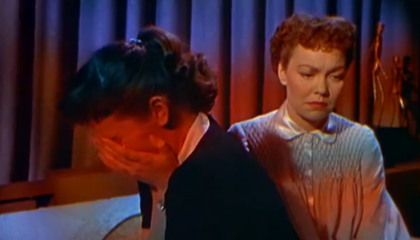
The vulnerable-looking Jane Wyman is the perfect identification model for this stealth ode to domestic non-conformism. Her Cary is mature, but also desirable and unspoiled, the product of Eisenhower's consumer success story. She's raised her kids and kept up appearances, and now isn't sure what she should be doing with her life. Characters in a soap opera mostly talk their problems to death. Douglas Sirk uses every tool at his disposal to help communicate Wyman's predicament away from verbal exposition. Cary finds herself alone, staring into mirrors and through windows. Visual clues emphasize the choices open to her, which boil down to a snowy isolation versus a fireplace with Ron. Their relationship is represented by a Wedgewood jug Ron repairs to please her. When it is accidentally broken, the suggestion is that Cary may be emotionally beyond repair. Within this consistently artificial world, the blunt symbol is more than acceptable. Sirk uses romance-novel fantasy to dramatize very real human emotions.
All That Heaven Allows' glossiest fantasy is Rock Hudson's Ron Kirby. The ruggedly handsome Ron works in gardens but never seems to sweat or get dirty. He embodies Henry Thoreau's Walden Pond philosophy of getting free of the rat race, which in this movie translates into ditching the country-club social swim for honest and open-minded friends. With his private acres in a verdant forest, Ron lives awfully well for a gardener and owner of a one-man tree nursery. And don't forget the picturesque abandoned mill, ideal for romantic meetings. It's almost a Disney fantasy out there, as every view is a gorgeous nature postcard. Ron's best friend is a deer that comes up for a handout. Ron is not an intellectual. He hasn't read Thoreau's writing; he simply lives it. A confident outdoorsman yet totally housebroken, Ron is gentle, sensitive, patient and thoughtful to an extreme... in other words, he's like no man alive.
Strangely enough, Jane Wyman wasn't even forty when she played Cary Scott, who is presumed to be at least 45. Is the idea that Ron Kirby can't find a passionate, soulful woman nearer his own age? He's such a mellow woodchuck that we understand his lack of attraction to the bouncy blonde 'young thing' Mary Ann (Merry Anders). Sirk's direction keeps our attention focused on various misunderstandings and bitter ironies, and even a wild accident occurring at an emotional highpoint. It results in one of those 'movie' injuries, the kind where one gets to stay at home in front of the fire and look as handsome as hell, while supposedly near death.
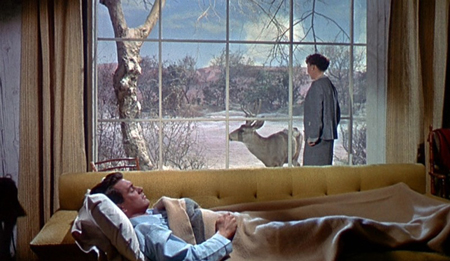
As if bestowing Mother Nature's blessing on their union, a real Bambi shows up as Ron and Cary regard their joyous future in a picture window view of a wintry Garden of Eden. Sirk and Jane Wyman pitch Cary's emotions perfectly, to match the emotional needs of their viewing audience. Despite the heavy stylization around Cary and Ron, their feelings never seem phony. Loneliness is a universal problem, and class snobbery is something we all can relate to. The final kicker is the loveless abuse of Cary's children. After ruining her chances of being with the man she loves, they bring her a cruelly ironic consolation prize, a television. The salesman might as well be sealing Cary in her tomb: " ... turn that dial and you have all the company you want right there on the screen. Drama, comedy, life's parade at your fingertips." The sight of Jane Wyman staring into the electronic grave is chilling. It's acknowledged as one of the more powerful film images of the decade.
Criterion's Dual-Format Blu-ray + DVD of All That Heaven Allows is a major upgrade from the company's DVD release of 2001. The remastered HD images replicate the saturated Technicolor hues of the original, which pop off the screen and have a marked emotional impact. Cameraman Russell Metty makes everything look clean, and bright, while fabrics, furs and faces take on a tactile quality. Producer Ross Hunter clearly had Universal's full cooperation, as the overall production is flawless. Frank Skinner's music score borrows from the work of Franz Liszt.
The major extra from the old DVD was Behind the Mirror: A Profile of Douglas Sirk, a 1979 BBC docu- interview that remains the best speaking record of the director. To this has been added another French TV interview from 1982, a new interview with Universal contract actor William Reynolds, a trailer and a commentary in which John Mercer and Tamar Jeffers-McDonald analyze all of the film's striking compositional effects.
Of particular interest is Mark Rappaport's Rock Hudson's Home Movies, which aren't home movies but an analysis of the actor's unique position as a gay man -- who acts in movies -- as a straight character -- often pretending to be gay. Rappaport explains that Hudson had a reel of film that he showed to friends at his house, clips from his movies that inferred a gay subtext. What at first appears to be a joke -- Rappaport mattes himself into the picture and performs the role of Rock's secret voice -- soon becomes entirely convincing. Hudson's dramas and comedies are indeed packed with what really seem to be intentional byplay with his secret closeted identity. His masculine womanizers are forever inventing comic alter egos with coded gay qualities. Even the male relationships in his films - the clips do have to be a bit selective here -- often involve a character lobbying to fend off female romantic complications. Rappaport's video piece is made from dozens of sometimes-ragged film clips. The biggest surprise is that the fun adds up to good film analysis. Rock Hudson was first and foremost a nice guy, and we come to better understand his strange predicament.
On a scale of Excellent, Good, Fair, and Poor,
All That Heaven Allows Blu-ray + DVD
rates:
Movie: Excellent
Video: Excellent
Sound: Excellent
Supplements: Commentary, vintage TV shows with director Sirk, interview piece with William Reynolds, trailer, Mark Rappaport essay film Rock Hudson's Home Movies.
Deaf and Hearing-impaired Friendly?
YES; Subtitles: English
N0; Subtitles: None
Packaging: Keep case
Reviewed: June 3, 2014
Republished by permission of Turner Classic Movies.
Footnotes:
1. One has to dig into old issues of Ladies' Home Journal or Redbook to fully understand the connection. Even the poster for All That Heaven Allows resembles the romantic illustrations that accompanied the fiction in these magazines.
Return
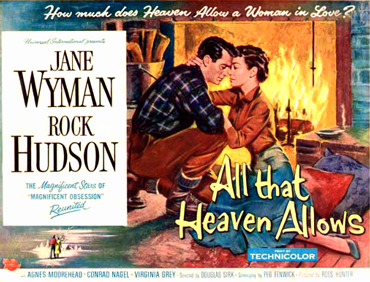

Text © Copyright 2014 Glenn Erickson
See more exclusive reviews on the Savant Main Page.
The version of this review on the Savant main site has additional images, footnotes and credits information, and may be updated and annotated with reader input and graphics.
Return to Top of Page
|

